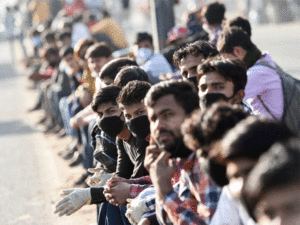
If the government successfully gives out the promised additional 5 kg food for most families, basic food may be taken care of, but distress will remain.

India may have to get used to social distancing as the country may be in the covid fight for the long haul. India will have to achieve herd immunity to be able to fully counter coronavirus, noted economist Swaminathan Aiyar has said.
Emphasizing that the current state-mandated 21-day lockdown may fail to effectively counter the covid-19 outbreak, he said, “I have a terrible feeling that we are going to get to the stage where everybody would have to get infected until we get to herd immunity.”
Herd immunity is when enough people in a population have immunity to an infection to be able to effectively stop that disease from spreading. According to experts 50 to 55% of a population will have to get infected before herd immunity is achieved. In India’s scenario, that may mean over 700 million people need to get infected.
India’s public health sector has already been spread thin, tackling the pandemic, with many healthcare organisations facing a severe shortage of basic protective gear and ventilator support. More and more private institutions have stepped in to help tackle the health crisis, along with Prime Minister Narendra Modi allocating Rs 15,000 crore for additional healthcare measures.
The lockdown may help reduce the immediate load on the healthcare system and correspondingly reduce the avoidable deaths– those who die due to lack of facilities such as ventilators.
However, ultimately enough people have to become immune to the disease to meaningfully slow its spread. That is when this thing will die out, Aiyar said.
He also stressed that India still hasn’t taken enough measures to effectively trace the spread of the virus, and treat every person affected, while also ensuring that the rest of the population has the means to survive a complete lockdown.
If the government successfully gives out the promised additional 5 kg food for most families, basic food may be taken care of, but distress will remain.
“There is a danger that apart from the virus itself, hunger will kill more people.” India’s population density is also such that ensuring social distancing is difficult, he feels, adding, “all the lockdown has done is put a stop to economic activity for the next 21 days.”
Highlighting the fear of a recession, Aiyar said, “it is a huge hit to the GDP, and to incomes. But it does not stop there, we are going to get into a very major recession.”
Former RBI governor Raghuram Rajan had warned of similar possibilities and hit to the Indian economy last week. “The lockdown keeps people at home which is not necessarily that pristine isolated place, but can also be a slum where people live together,” Rajan said to Bloomberg on why the lockdown may be counterproductive.
Source: indiatimes.com

